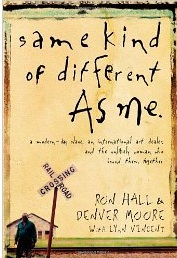So it turns out that much of what you and I spend our time on doesn’t matter. In particular, if you’re trying to reduce the suffering of people impacted by poverty, hunger or homelessness…at least according to Carlos Slim. Carlos Slim is ranked by Forbes magazine as the richest man in the world. Mr. Slim (the richest man in the world, ought to get a little respect) was quoted last week saying: 
“The only way to fight poverty is with employment, trillions of dollars have been given to charity in the last 50 years, and they don’t solve anything.”
Interestingly, Mr. Slim has given BIG money to charities. So it isn’t that he doesn’t give, but it appears that he believes that the way to truly make a difference is by creating jobs and building businesses. It seems he thinks that the real way to make a difference in the world is to through commerce.
We won’t quibble too much with Mr. Slim, except to say he’s dead wrong. We doubt that we can change Mr. Slim’s mind but we’d like to get you thinking.
The key to Mr. Slim’s dissatisfaction is his expectations of what his giving accomplishes.
He’s wanting to eliminate poverty or hunger or whatever. We’re pretty sure that poverty is part of this broken, messed up world. It’s not going away. But “poverty” is different than a hungry child named Ming or Dominique or Sally or…even Carlos. Feeding one child or one family or one village is possible. Providing clean water or warm clothing to individuals is doable. Giving children safe places to sleep is within reach. And, if you’re that one person whose life is changed, then it’s pretty nice to have a full belly or sobriety or safety.
The lesson for all of us in the fundraising or charity world is to set the expectations of our donors–donors at all giving levels. We believe that one of the key reasons major donors stop giving is because they don’t understand the difference they’re making though their giving (and probably that they don’t feel connected to the heart of the organization’s work).
And one other thing, maybe, just maybe, that the one who needs Mr. Slim’s charitable giving the most is Mr. Carlos Slim.
That’s our nifty segue into the second of our 8 in 8 book give away. “8 in 8” is Oneicity’s current giveback. We’re giving to our readers books that have impacted us personally and professionally. These are the books we think you should read.
This week’s book is: “Same Kind of Different As Me”
 The book tells a completely true story from two perspectives — Ron Hall, a successful yet self-centered international art dealer, and Denver Moore, a homeless man who grew up picking cotton as a Louisiana sharecropper.
The book tells a completely true story from two perspectives — Ron Hall, a successful yet self-centered international art dealer, and Denver Moore, a homeless man who grew up picking cotton as a Louisiana sharecropper.
Their worlds couldn’t be more different, but when Ron’s big-hearted wife Deborah volunteers Ron for serving meals at a Fort Worth homeless shelter, the two men strike up an unlikely friendship that sustains them through tragedy and leaves them changed forever.
We think you’ll be changed forever if you read the book as well. If you want a chance to win your own copy of “Same Kind of Different as Me” all you have to do is comment this week on a blog post or on the Oneicity Facebook wall. Everyone who comments has a chance to win (not per comment). We’ll choose a lucky commenter at random and send them their very own copy of the book.
Maybe Mr. Slim needs to run into his “Denver Moore” to change his perspective on how this charitable giving thing works.
So what do you think? Do you have any donors who think like Mr. Slim? What do you think about the idea that donors are personally impacted by their giving as much as the charity? And have you read or heard about “Same Kind of Different As Me?”
We love hearing what you’re thinking.
***UPDATE: Kitty Sargent is the winner of this 8 in 8 give away. We know Kitty will love the book. Thanks for joining in and to everyone who didn’t win, keep commenting, we’re just getting started on the give away.

Hoots and Thomas
(photo credit: CarbonNYC)


17 thoughts on “charitable giving doesn’t change a thing”
I think donors definitely are impacted by their giving, but the bigger impact comes from volunteering.
@Kitty-great point! Experience is a key component for many if not most.
Certainly, generational issues come into play among other factors. In broad strokes I’d think that experiences such as volunteering are more important the younger the donor is.
What do you think?
Thanks for the comments.
st
Hearing your recommendation and living in Ft Worth makes me want to read this book. Sounds great! Many donors I know, especially sub-35-year olds seem to be wanting/searching for organizations that will allow them to do more than write a check and receive a newsletter. They want to be transformed through their giving and get their hands dirty.
@Lanny–you’re right on point. Many donors are looking to do more than write a check. They’re hungry to see and feel–or as you said: “get their hands dirty.” From running in races to building houses to touring your facilities, involvement and experience are the keys.
Wait a week and see if you’re the lucky winner before you buy the book!
Thanks for joining the conversation.
st
I think Mr. Slim may be referring to sustained change. A meal today is great, but a job so that I can buy food tomorrow is better. I think of several nonprofit organizations involved in microlending. The provision of small business loans to those who do not have access to regular credit markets helps lift them out of a cycle of poverty. This is a “one person at a time” activity that affects communities.
It is interesting to see the numbers on microlending. One nonprofit organization shares their loan repayment rate is better than commercial bank lending. The benefit is the money can then be loaned again to the next person, affecting the next community.
@Jeffrey–thanks for the reminder about micro-lending. While not an area of extensive expertise, we do know a little and have enve given to a micro-lending org. The repay/default rates that I’ve seen are startling. And I love how organic micro-lending is.
Kiva.org experienced some of the downsides of borderless communication a few months ago. Which is a great example of how micro-lenders, like many NPOs, have to take a careful look at how they’re setting their donors’ expectations. Micro-lending and child sponsorship are areas where donors can not have a good picture of the realities on the field. (See #9 A&B on this post: https://www.oneicity.com/blog/the-future-of-fundraising/).
Great perspective, wouldn’t expect anything less from you Jeffrey.
You make us better. Thanks.
st
This thoughtful post has reminded me that our supporters are wanting to know the impact their gift is having. Long term, sustainable change takes place one donor and one dollar at a time. Our job is to relay, with emotion and clarity to all investors, the impact their gift has which often will cause them to do more.
Thank God there are so many of us who think what this man said is complete rubbish! It sorta makes me want to work even harder at helping as many people as I can.
Sandy Rees
@Sandy–I’m glad you’re motivated.
I will note that Mr. Slim donates breath-taking amounts of money to charities. So, most NPOs would kill (maybe literally) to have him as a donor. Something to note is that I suspect he’d be a capricious donors–in and out–telling you what to do–etc. What I am sure of, is that a donor who doesn’t really believe in what they’re doing through the org they support won’t be a good long-term donor.
Great to hear from you Sandy.
st
@Lori — I’m with you.
So, what are some of the best ideas the Oneicity tribe knows to keep donors in tune with your org’s work?
st
As a member of the Oneicity tribe, I’ll take a stab at answering your question. It’s the job of an NPO leader to unabashedly share their passion for the work they are doing any way they can. They have to tell the story of the lives being changed through the generosity of the donors. And they have to meet the donors where they hang out: blogs, email, Facebook, Twitter, coffee meet-ups — even a call on the telephone or direct mail.
I was concerned when I first read the comment by Mr. Slim that he thought he could do more good by creating jobs than charity. But I’m glad to know he’s given a lot to charity too. I do think jobs engender self-respect and sustainable income, but there are intractable problems in this world that can only be tackled by organizations who rely on charity. I vote for charity myself!
@Hoots — Yep. You’re dead on target.
And, you know I’ve wondered about those who don’t/can’t/won’t promote their organization’s work.
Sometimes leaders say it’s “unseemly” or “self-promoting” but if the NPO is donor-centric and only talking about the needs they’re filling or the people that need their help or the ways they’re changing the world… it isn’t self-promoting it is saving lives and filling stomachs (or whatever it is that the org does).
Just saying… Thanks for jumping in. You know how much I love the way you think.
st
It seems almost contrary to me that donors wouldn’t want to be involved in the organizations they give to. Like many of you have observed, I’ve found this to be especially true with members of the younger generation. They’re motivated to work for the causes they believe in and they want to do a lot more than just give some money.
@Sherry–the tricky part I think is involving donors. Most of us agree on that, but how?
How does the organization get donors in touch with what is going on?
We know one brilliant Executive Director that expanded the scope of their events to accommodate the number of volunteers he was getting. Interestingly, the event has continued to grow. More volunteers led to broader reach of the event. That led to more people literally being served. And more volunteers came… it is amazing what can happen when you have the courage to allow your donors to be involved in your work.
Great to have you here.
st
I think it is worth unpacking Mr. Slim’s statement a bit. While trillions of dollars have been given to charity over the last 50 years, most of them haven’t gone to solving poverty. Remember that in the US, the largest chunk of individual giving goes to religion… followed by health and education.
Now, while education is clearly a path out of poverty, I’d venture that the largest sums go to higher ed, not exactly what I’d classify as fighting poverty.
I agree completely with the premise that the best way out of poverty is a job that plays a living wage. And I’d venture to challenge Mr.Slim that there is a lot more the very rich could do to ensure that… but that business doesn’t track to jobs, business tracks to making a profit. So in the absence of a social compact that values jobs for many over great wealth for some, charity is left to ameliorate the conditions of people who don’t have enough while others have way more than they’ll ever need.
And we shouldn’t pat ourselves on the back in this sector either. The poor would be a lot better off if donors redirected more of the charity that goes to support the institutions of the well-off to the organizations that either directly serve the poor or advocate on their behalf.
Pingback: oneicity // income solutions for non-profits » happy 2nd anniversary